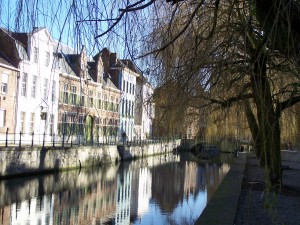The house doesn’t always win
By Khaled Diab
Despite the current crisis in the property market, the belief that buying a house is a long-term winner persists. But does the house always win?
21 June 2009

The property bubble that enveloped the UK, the US and much of Europe did not just pop, it exploded like a ticking timebomb and has claimed millions of new homeowners as its victims.
Belgium has been spared some of the agony other countries have experienced, owing to tougher controls, such as a high stamp duty of up to 12% and the relative difficulty of getting a mortgage. Although there was also a bubble in which house prices more than doubled in some places in a decade, the property market here has generally stagnated or fallen slightly, rather than collapsed. Properties at the top of end of the market are the ones that have suffered the greatest, while those in the middle have remained quite stable. People who don't need to sell are mostly holding back, reducing supply.
Whether or not it's a good time to be buying or selling, my wife and I have reached a stage in our lives where we need to move. We adore our current home in a working-class neighbourhood of Ghent, the scenic university town. Its main drawback is that it is pretty tiny.
With all the uncertainty in the air, we decided that it would be wisest to find a buyer for our house, before we went out and bought a new property. If we didn't get the offer we wanted, we contended, we could just take it off the market again.
So as not to feel pressured by an estate agent and to save us the very high commissions agents charge here, we decided to sell the place ourselves. We were confounded by the intensity of the response, and after less than a week of playing estate agent, we had an attractive offer.
But the elation at our early success was to prove short-lived, as we discovered that reports of the demise of the property market were greatly exaggerated.
There is something about buying a house that makes you suddenly feel poorer. Before we'd embarked on our house hunt, we were feeling quite flush and thought that we'd have little trouble locating an affordable property.
But after a few demoralising weeks of visiting apprentice ruins, DIY disaster zones or ridiculously overpriced conversions, we realised that the mission would be tougher than we thought. The gems in the market are few and far between and go like hotcakes – so fast, in fact, that we barely get past the threshold or even pick up the phone before we learn it's been sold. How some people can make on-the-spot decisions about a house, when we don't usually even do that with clothes, is beyond us.
This has led my wife to jokingly liken our situation to that of the pregnant Mary and Joseph, with our cat instead of the donkey in this adaptation, looking for some shelter in Bethlehem. But I do hope our baby won't be born in a manger.
Caught as we are in a race against the contractual and biological clock, our quest has been invested with certain amount of extra excitement – actually, stress – and checking property websites has become something of an obsession. We have also widened our search area and are considering the previously unthinkable notion of buying a rundown property to renovate.
Our predicament is shared by many others – and we're in a much better position than many more – and raises some uncomfortable questions. The most fundamental of these is: how sustainable is the property market?
If we, on two relatively decent incomes and with our feet already on the bottom rung of the property ladder, are having so much trouble finding an affordable house, how about people on a single income (or even benefits) and with large families? One young couple in Ghent visited more than 100 houses over a three-year period before they found their dream home at an affordable price.
How about future generations? Will our unborn child need to be a millionaire just to buy a starter's home? Should the government not have some plan for developing affordable housing for those on limited incomes and future generations?
If we buy a house now, are we setting ourselves up for a potentially huge loss in the future? Is renting a better alternative or are you then simply paying for someone else's property with nothing to show for it?
The approach we've decided on is similar to the one we followed when buying our current house, because our concerns were perhaps even greater during the boom years. We view property not as an investment but, first and foremost, as somewhere to live which will be completely ours in our silver years.
In addition, it it is essential that we find a place that we can afford comfortably and not overstretch ourselves financially. This is partly because we want a house to live in, not to live in perpetual servitude to a house. We also want to make sure that our mortgage is still affordable even if we lose one of our incomes, just in case our financial position worsens.
This column appeared in The Guardian Unlimited's Comment is Free section on 14 June 2009. Read the related discussion.


